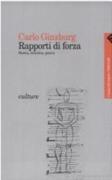Rapporti di forza

The discussions on the historical method issues affect today issues not limited only to specialists. The reduction of historiography in rhetoric, fueled by postmodern skepticism, met the political positions of the movements based on ethnic identity or gender. Who has claimed the partiality of historical knowledge made it referring to the analysis of knowledge in terms of power proposed by Foucault, or the idea that the prevailing version of the past is the most rhetorically effective. Both perspectives are derived from Nietzsche: more precisely, according to Carlo Ginzburg, from the reading, drawn up in the Seventies, of an unpublished text of the young Nietzsche, where the notion of truth was traced back to a rhetorical dimension. To the rhetoric of Nietzsche, echoed by his followers today, Ginzburg counters another rhetoric, that one founded by Aristotle and transmitted from Quintilian to Lorenzo Valla. At the center of this tradition there is the link between rhetoric and testing, illustrated here through the analysis of a little-known page and a popular one: the denunciation of European colonialism that a French Jesuit of the eighteenth century attributed to the chief of an indigenous uprising, and the Sentimental education's white space in which Proust saw the climax of the whole work of Flaubert. The conclusion of the study brings us back to colonialism, and to the powerful inclusiveness of the classical tradition: an example that illustrates the balances of power evoked in the book's title through a masterpiece as the Demoiselles d'Avignon by Picasso.